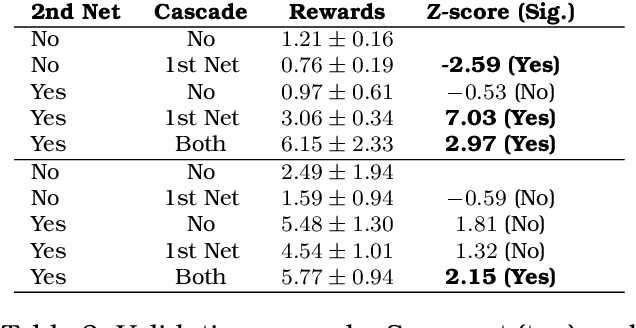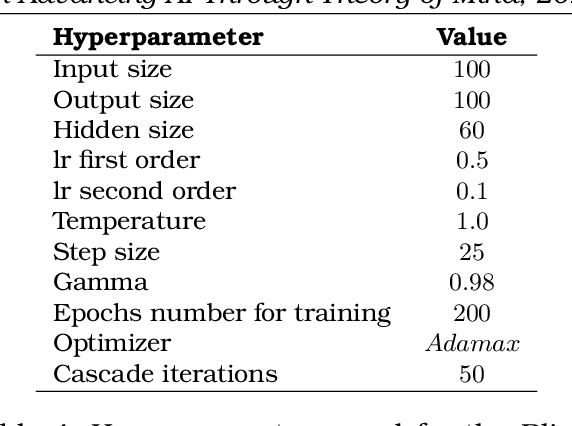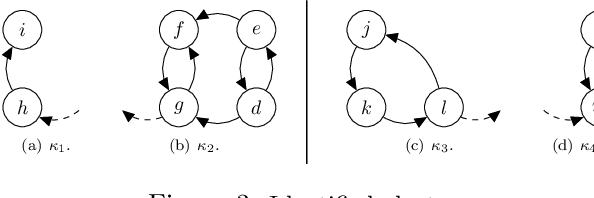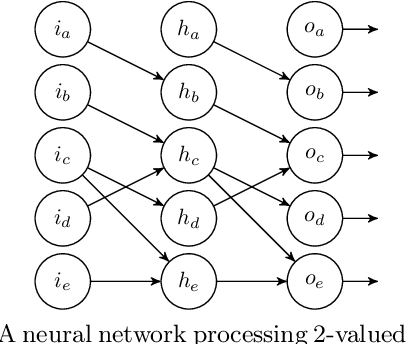Stefan Sarkadi
Proceedings of 1st Workshop on Advancing Artificial Intelligence through Theory of Mind
Apr 28, 2025



Abstract:This volume includes a selection of papers presented at the Workshop on Advancing Artificial Intelligence through Theory of Mind held at AAAI 2025 in Philadelphia US on 3rd March 2025. The purpose of this volume is to provide an open access and curated anthology for the ToM and AI research community.
All You Need is Sally-Anne: ToM in AI Strongly Supported After Surpassing Tests for 3-Year-Olds
Mar 31, 2025Abstract:Theory of Mind (ToM) is a hallmark of human cognition, allowing individuals to reason about others' beliefs and intentions. Engineers behind recent advances in Artificial Intelligence (AI) have claimed to demonstrate comparable capabilities. This paper presents a model that surpasses traditional ToM tests designed for 3-year-old children, providing strong support for the presence of ToM in AI systems.
Deception Analysis with Artificial Intelligence: An Interdisciplinary Perspective
Jun 11, 2024



Abstract:Humans and machines interact more frequently than ever and our societies are becoming increasingly hybrid. A consequence of this hybridisation is the degradation of societal trust due to the prevalence of AI-enabled deception. Yet, despite our understanding of the role of trust in AI in the recent years, we still do not have a computational theory to be able to fully understand and explain the role deception plays in this context. This is a problem because while our ability to explain deception in hybrid societies is delayed, the design of AI agents may keep advancing towards fully autonomous deceptive machines, which would pose new challenges to dealing with deception. In this paper we build a timely and meaningful interdisciplinary perspective on deceptive AI and reinforce a 20 year old socio-cognitive perspective on trust and deception, by proposing the development of DAMAS -- a holistic Multi-Agent Systems (MAS) framework for the socio-cognitive modelling and analysis of deception. In a nutshell this paper covers the topic of modelling and explaining deception using AI approaches from the perspectives of Computer Science, Philosophy, Psychology, Ethics, and Intelligence Analysis.
Deceptive AI Ecosystems: The Case of ChatGPT
Jun 18, 2023Abstract:ChatGPT, an AI chatbot, has gained popularity for its capability in generating human-like responses. However, this feature carries several risks, most notably due to its deceptive behaviour such as offering users misleading or fabricated information that could further cause ethical issues. To better understand the impact of ChatGPT on our social, cultural, economic, and political interactions, it is crucial to investigate how ChatGPT operates in the real world where various societal pressures influence its development and deployment. This paper emphasizes the need to study ChatGPT "in the wild", as part of the ecosystem it is embedded in, with a strong focus on user involvement. We examine the ethical challenges stemming from ChatGPT's deceptive human-like interactions and propose a roadmap for developing more transparent and trustworthy chatbots. Central to our approach is the importance of proactive risk assessment and user participation in shaping the future of chatbot technology.
Reflective Artificial Intelligence
Jan 25, 2023Abstract:Artificial Intelligence (AI) is about making computers that do the sorts of things that minds can do, and as we progress towards this goal, we tend to increasingly delegate human tasks to machines. However, AI systems usually do these tasks with an unusual imbalance of insight and understanding: new, deeper insights are present, yet many important qualities that a human mind would have previously brought to the activity are utterly absent. Therefore, it is crucial to ask which features of minds have we replicated, which are missing, and if that matters. One core feature that humans bring to tasks, when dealing with the ambiguity, emergent knowledge, and social context presented by the world, is reflection. Yet this capability is utterly missing from current mainstream AI. In this paper we ask what reflective AI might look like. Then, drawing on notions of reflection in complex systems, cognitive science, and agents, we sketch an architecture for reflective AI agents, and highlight ways forward.
Online Handbook of Argumentation for AI: Volume 1
Jun 22, 2020

Abstract:This volume contains revised versions of the papers selected for the first volume of the Online Handbook of Argumentation for AI (OHAAI). Previously, formal theories of argument and argument interaction have been proposed and studied, and this has led to the more recent study of computational models of argument. Argumentation, as a field within artificial intelligence (AI), is highly relevant for researchers interested in symbolic representations of knowledge and defeasible reasoning. The purpose of this handbook is to provide an open access and curated anthology for the argumentation research community. OHAAI is designed to serve as a research hub to keep track of the latest and upcoming PhD-driven research on the theory and application of argumentation in all areas related to AI.
 Add to Chrome
Add to Chrome Add to Firefox
Add to Firefox Add to Edge
Add to Edge